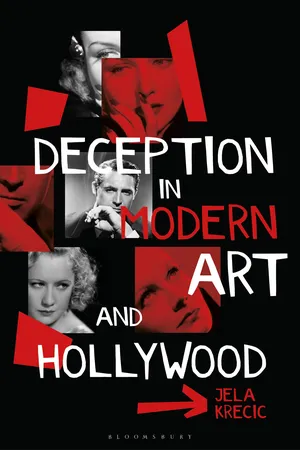
- 225 pages
- English
- PDF
- Available on iOS & Android
eBook - PDF
Deception in Modern Art and Hollywood
About this book
Over the last 200 years, a paradoxical fear of deception has grown in the fields of art and popular culture – modes of expression that are traditionally dedicated to creating illusory, artificial worlds. More and more, fiction is expected to reflect what we perceive to be reality and, simultaneously, to indicate to viewers that they are dealing with deceptive strategies. But what if fabrications are not devoid of truth? What if art and popular culture, with all their fakery, can critically and convincingly tackle individual or political predicaments? And what if, as Jacques Lacan put it, truth has the structure of a fiction?
Deception in Modern Art and Hollywood pursues this topic on several levels. It explores the philosophical implications of 'being in the know' and the fear of deception within the theoretical frame of Hegelian dialectics and Lacanian psychoanalysis. Meanwhile, a Marxist theoretical tradition – from Theodor Adorno to Fredric Jameson and Louis Althusser – is used to conceptualize the broader historical, social and political implications of these ideas.
Ranging from the late nineteenth century to the present day, this exciting text takes psychoanalytic and Marxist theory to classic Hollywood themes of appearance, mediation, indirection and deception. It presents a novel understanding of our ongoing, entangled affair with moving images, and the emancipatory messages that they contain.
Deception in Modern Art and Hollywood pursues this topic on several levels. It explores the philosophical implications of 'being in the know' and the fear of deception within the theoretical frame of Hegelian dialectics and Lacanian psychoanalysis. Meanwhile, a Marxist theoretical tradition – from Theodor Adorno to Fredric Jameson and Louis Althusser – is used to conceptualize the broader historical, social and political implications of these ideas.
Ranging from the late nineteenth century to the present day, this exciting text takes psychoanalytic and Marxist theory to classic Hollywood themes of appearance, mediation, indirection and deception. It presents a novel understanding of our ongoing, entangled affair with moving images, and the emancipatory messages that they contain.
Frequently asked questions
Yes, you can cancel anytime from the Subscription tab in your account settings on the Perlego website. Your subscription will stay active until the end of your current billing period. Learn how to cancel your subscription.
No, books cannot be downloaded as external files, such as PDFs, for use outside of Perlego. However, you can download books within the Perlego app for offline reading on mobile or tablet. Learn more here.
Perlego offers two plans: Essential and Complete
- Essential is ideal for learners and professionals who enjoy exploring a wide range of subjects. Access the Essential Library with 800,000+ trusted titles and best-sellers across business, personal growth, and the humanities. Includes unlimited reading time and Standard Read Aloud voice.
- Complete: Perfect for advanced learners and researchers needing full, unrestricted access. Unlock 1.4M+ books across hundreds of subjects, including academic and specialized titles. The Complete Plan also includes advanced features like Premium Read Aloud and Research Assistant.
We are an online textbook subscription service, where you can get access to an entire online library for less than the price of a single book per month. With over 1 million books across 1000+ topics, we’ve got you covered! Learn more here.
Look out for the read-aloud symbol on your next book to see if you can listen to it. The read-aloud tool reads text aloud for you, highlighting the text as it is being read. You can pause it, speed it up and slow it down. Learn more here.
Yes! You can use the Perlego app on both iOS or Android devices to read anytime, anywhere — even offline. Perfect for commutes or when you’re on the go.
Please note we cannot support devices running on iOS 13 and Android 7 or earlier. Learn more about using the app.
Please note we cannot support devices running on iOS 13 and Android 7 or earlier. Learn more about using the app.
Yes, you can access Deception in Modern Art and Hollywood by Jela Krecic in PDF and/or ePUB format, as well as other popular books in Philosophy & Popular Culture in Art. We have over one million books available in our catalogue for you to explore.
Information
Table of contents
- Half Title
- Series Page
- Title Page
- Copyright Page
- Contents
- Acknowledgements
- Introduction: On bad life and good fiction
- Chapter 1: Modernism, postmodernity or the fate of self-aware art
- Chapter 2: Comedy, acting and stardom . . . and fear of falsity
- Chapter 3: Popular culture and its discontents
- Chapter 4: The trouble with endings, or, why TV series cannot end
- Chapter 5: Tarantino’s love letter to Hollywood: Fiction against ideology
- Notes
- Bibliography
- Filmography
- Index